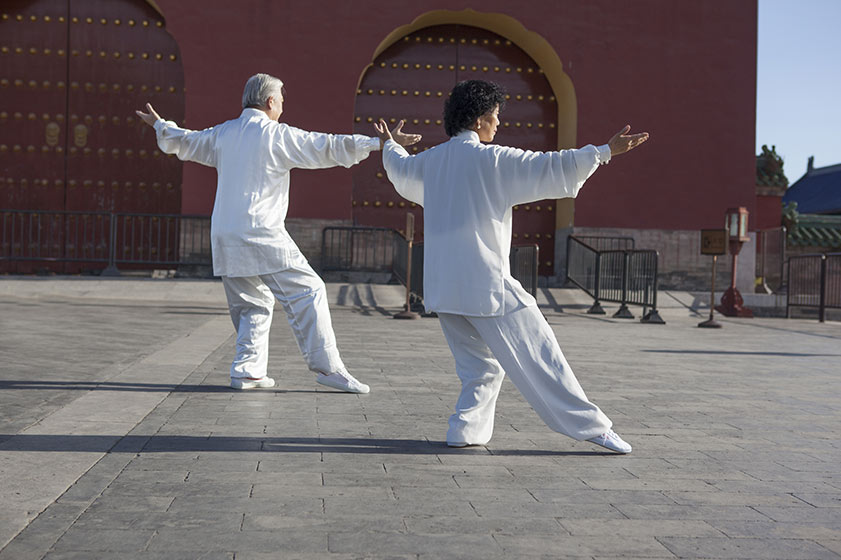Tai Chi is a form of Chinese martial art that involves both the use of your mind and body. As such, it is one of the most effective exercises for mental and body wellness. In fact, studies have shown that practicing Tai Chi can help with medical conditions like hypertension, stroke, heart disease, Parkinson’s disease and sleep problems, just to name a few. Since Tai Chi is performed by slowly breathing, and calmly moving through a sequence of movements, it can even be practiced by people with arthritis. Tai Chi has numerous benefits for all family members, and can help you live out your retirement years with full of energy and happiness! Read on to learn about all the lifelong benefits of Tai Chi for seniors!
Decreased Stress, Depression, and Anxiety
According to medical studies, Tai Chi can decrease stress, anxiety, and depression. It’s also been proven to help treat addiction, high blood pressure, and high cholesterol. Other Tai Chi benefits include increased strength, energy, and flexibility. It’s an excellent low-impact exercise that gives both your body and mind a good workout. Regular practice of Tai Chi can lead to lasting health benefits for years to come.
Improved Mood
Tai Chi is a great way to relieve stress and increase your mood. Participating in regular exercise can lead to lower levels of anxiety, improved sleep, and improved self-esteem. Studies have shown that people who practice Tai Chi regularly report less stress than people who don’t practice it at all. Because of these benefits, you may be less likely to succumb to depression or seek prescription drugs for anxiety relief. By practicing Tai Chi regularly, you’ll find yourself more relaxed and confident with each passing year.
Improved Aerobic Capacity
Tai Chi is a type of exercise that improves your body’s ability to take in oxygen, an effect that is often measured by a person’s VO2 max. The more efficient your cardiovascular system becomes, the more calories you’ll burn during exercise and, more importantly, the longer you can keep going without experiencing fatigue. Some studies have found that Tai Chi offers an aerobic training effect that rivals some forms of interval training. Because of its low-impact nature, Tai Chi can be done by physically inactive individuals and those who already exercise regularly.
Increased Energy and Stamina
In a 2014 study from researchers at China’s Zhejiang University, Tai Chi increased overall energy and stamina by an average of 23 percent. Improvements like these may help with everyday activities like climbing stairs or carrying groceries, and potentially reducing the risk for falls, which is an essential part of staying safe as you age.
Improved Balance, Flexibility and Agility
As we age, we lose flexibility in our muscles and joints. When we don’t work to improve and maintain flexibility, we can experience a wide range of serious physical problems like muscle or joint pain that keep us from enjoying regular daily activities such as walking around town or exercising. Hence, it’s essential to engage in physical activity early and often. Tai Chi is a great way to improve your flexibility, balance, and agility. Some studies even show that Tai Chi might help with memory and cognition as you age.
Improved Muscle Definition and Strength
A study at Stanford University concluded that Tai Chi can help people of all ages and physical abilities achieve improved muscle strength and definition. Stronger muscles can help you lose weight since they support your metabolism and allow you to burn more calories. Plus, if you want to improve flexibility or even try a new hobby, it’s easier to begin exercising if your body is strong enough to handle it.







